With the increasing shift towards remote work in recent years, it’s more important than ever to take data security and privacy seriously. After all, cyberattacks and data breaches can be both costly and damaging to your company’s reputation.
So, how do we protect our sensitive data and privacy while working remotely? Grab your favorite cup of coffee, and let’s dive into some essential tips for keeping your digital workspace secure.
Use a Virtual Private Network (VPN)
A VPN is like a secure tunnel that encrypts your internet connection, making it harder for hackers to intercept or tamper with your data. By using a VPN, you’re making it more difficult for anyone to spy on your online activities, which is especially important if you’re handling sensitive information.
Keep your software up to date
Updating your software might seem like a no-brainer, but it’s easy to forget or put off. Regular updates ensure that you’re protected from the latest security threats, as developers often release patches to fix vulnerabilities. So make sure to update your operating system, antivirus, and other applications regularly.
Enable multi-factor authentication (MFA)
MFA adds an extra layer of security by requiring at least two different methods of verification before granting access to your accounts. This usually involves something you know (like a password) and something you have (like a smartphone app or a physical token). Even if your password is compromised, MFA can help prevent unauthorized access to your accounts.
Don’t reuse passwords
We’ve all been guilty of using the same password for multiple accounts, but it’s a risky practice. If a hacker cracks one account, they can potentially gain access to all of your other accounts that use the same password. Create unique, strong passwords for each account, and use a password manager to help you keep track of them.
Be cautious with public Wi-Fi
Working from a coffee shop or a library can be a refreshing change of pace, but public Wi-Fi networks can be risky. Hackers can set up fake networks or intercept your data on public networks, so avoid accessing sensitive information or making online transactions on public Wi-Fi. If you must use public Wi-Fi, always connect through a VPN.
Educate yourself and your team
Security is everyone’s responsibility. Invest time in educating yourself and your team about the latest cybersecurity threats and best practices. Encourage open communication and create a culture where employees feel comfortable reporting potential security issues.
Implement a clear remote work security policy
Having a well-defined security policy for remote work can help ensure that everyone understands their responsibilities and follows the necessary protocols. Your policy should cover topics like password management, secure file storage and sharing, and handling sensitive information.
Regularly back up your data
Backing up your data ensures that you have a copy of your important files in case of a cyberattack, hardware failure, or even human error. Use a secure, encrypted cloud storage service or an external hard drive to back up your data regularly. In conclusion, securing your remote workspace might require a bit of extra effort, but it’s well worth it to protect your sensitive data and privacy. By following these tips and staying vigilant, you’ll be well on your way to a secure and successful remote work experience. Stay safe out there, and happy working!
